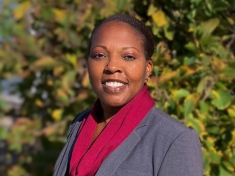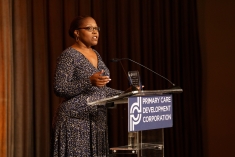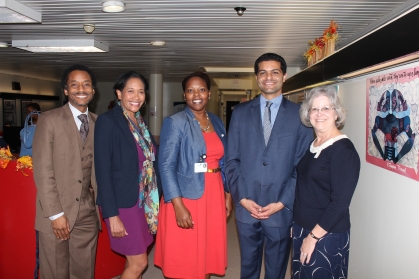
A Publication for Alumni & Friends of Rutgers Robert Wood Johnson Medical School

CEO of Trenton Health Center Kemi Alli, MD ’95: Driven to Improve Health Care and Outcomes for All

As chief executive officer of the Henry J. Austin Health Center (HJAHC) in Trenton, N.J., Kemi Alli, MD ’95, is continually asking, “How can we make things better for the most amount of people?” A pediatrician by training, Dr. Alli moved into administration because of a desire to make the biggest impact. As CEO, she can improve the quality of life for the more than 18,000 people who walk through the federally funded health center’s door every year.
Dr. Alli had several years of formal administrative training in her tenure as CEO, and she transformed the health center, nearly tripling its budget and adding an abundance of services and care to Trenton’s most vulnerable population.
Dr. Alli spent her formative years in West Africa—leaving Somerville, N.J., when she was 8 and returning to the United States for college at 18. Living in Africa, Dr. Alli says she was surrounded by people who looked like her, and she saw her reflection in the president, the dean of a college, and a doctor, for example.

Because of her experience in Africa, paired with positive experiences at Rutgers University and Rutgers Robert Wood Johnson Medical School, which are both diverse institutions, it wasn’t until medical school clinical rotations that Dr. Alli truly recognized that people are treated differently based on their race, ethnicity, and poverty levels. This became further evident for Dr. Alli during her residency, when she was exposed to different types of healthcare models, from private practice in the suburbs to specialty clinics and qualified health centers. She explains, “There was a palpable difference between the expectations providers have for the haves and the have-nots in their health and in their treatment.”
This dichotomy resonated with Dr. Alli, who declared that she wanted to be a good provider for those who “do not have” because they deserve it—they are human beings like everyone else.
Says Dr. Alli, “We are who we are by circumstance. I could have been born in a different country and a different time. I have certain privileges and authority that I do not take for granted.” After her residency, she applied exclusively to community health centers. Her first position was as a part-time pediatrician at the Henry J. Austin Health Center. She later became the pediatric section chief, chief medical officer, and ultimately CEO in 2015.
The Henry J. Austin Health Center
The Henry J. Austin Health Center delivers person-centered, high-quality holistic care to the people of Trenton. Dr. Alli has been with the health center for 24 years. Always looking to make improvements, in 2010, she started writing policies and regulations, which she saw as a chance to improve many people’s lives at one time.

Dr. Alli says when she first became CEO, the health center was experiencing challenges financially. The center needed to have enough profit margin to be a viable organization, and she tasked herself with discovering how to maximize revenue.
Traditionally, health centers typically only offered primary care services. Seeing a vital need in the community, Dr. Alli wanted to add behavioral, mental, and integrated health care but had to figure out how this could be sustainable and generate revenue.
Dr. Alli explains that in 2016, there were only three revenue codes to get reimbursed for mental health services. For other areas of medicine, there were hundreds. Dr. Alli worked with New Jersey Primary Care Association and other health centers to change regulations in the state to open up more codes for reimbursement. Her work, along with that of other health center CEOs, yielded the creation of 10 additional codes, enabling not only the HJAHC, but the entire state, to open and grow their behavioral health care departments. In addition, Dr. Alli’s team added revenue sources such as a pharmacy and expanded services. Through Dr. Alli’s leadership, the health center’s annual budget rose from $13 million to $37 million between 2016 and 2022.
Dr. Alli sees her role as providing exempliary services with high-performing and happy staff. She stresses, “An organization can only be as good as the people in it. My role now is to champion our organization not just for our community, but for our staff.”
With the center now financially sound, Dr. Alli sees her role as providing exemplary services with high-performing and happy staff. During the “great resignation” that happened throughout the country, Dr. Alli asked herself how they are providing for their staff. She stresses, “An organization can only be as good as the people in it. My role now is to champion our organization not just for our community, but for our staff. We are looking at how to create a positive work environment for those who work here and are also exploring benefits like on-site childcare.”
Great Needs, but Great Opportunities
Dr. Alli recognizes the vast and overwhelming healthcare needs of her community and admits it can be overwhelming, but she doesn’t resign herself to that fact; instead, she thinks of ways to do even more. Dr. Alli wants to address trauma informed care, which is paramount in communities of poverty. She also plans to tie together mental and behavioral health through more telehealth opportunities.

Dr. Alli identifies the ability to perform telehealth as a positive outcome of the COVID-19 pandemic. She notes that there was a 30 percent increase in visits during that time and she does not want to lose the momentum, saying, “We have to rethink the way we deliver care. What does a hybrid of telehealth and in-person visits look like? How are we creating best practices?”
Ultimately, each of Dr. Alli’s goals and plans are centered around servicing the most people, the most equitably. “A person is not defined by illness or circumstance. I am proud to work in an industry where we treat people like people. It’s not for the recognition, pay, or glory. It is for the legacy of making the world a better place, and I think we do that.”
